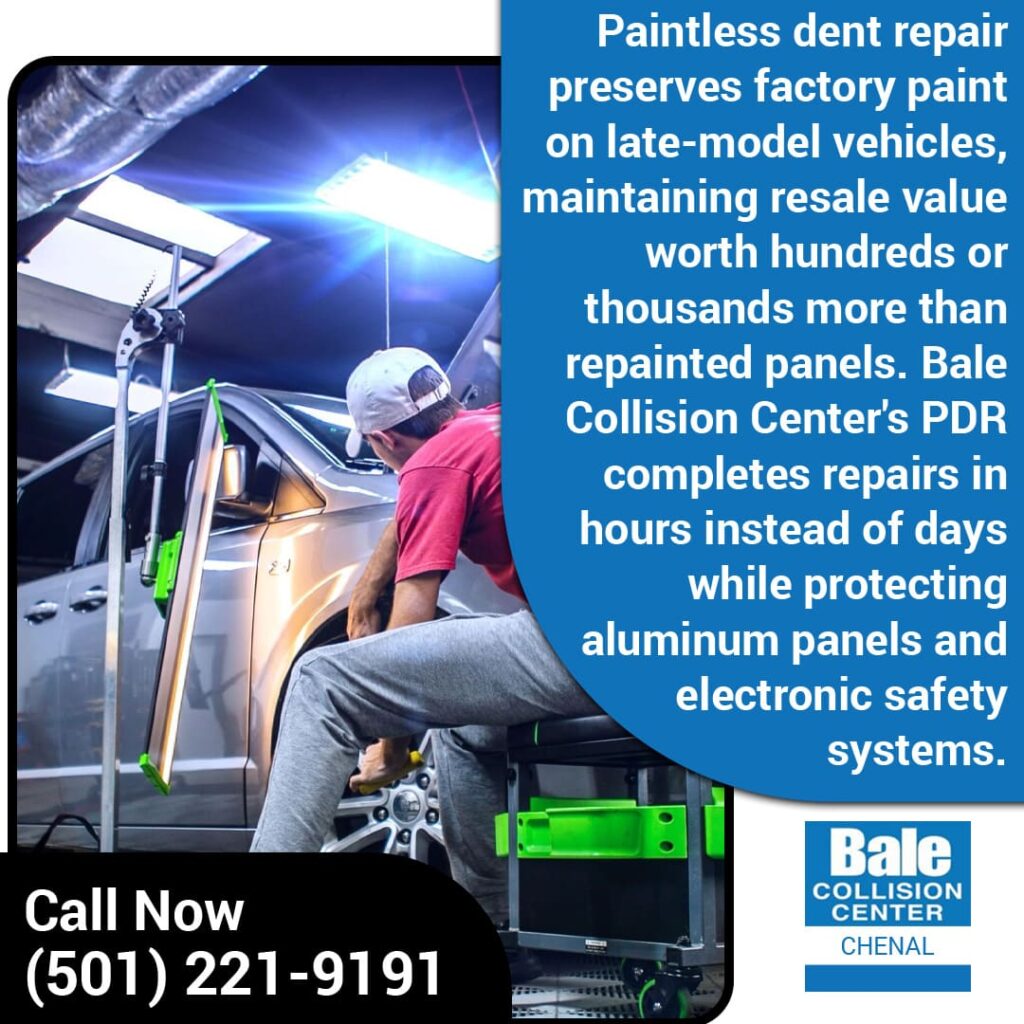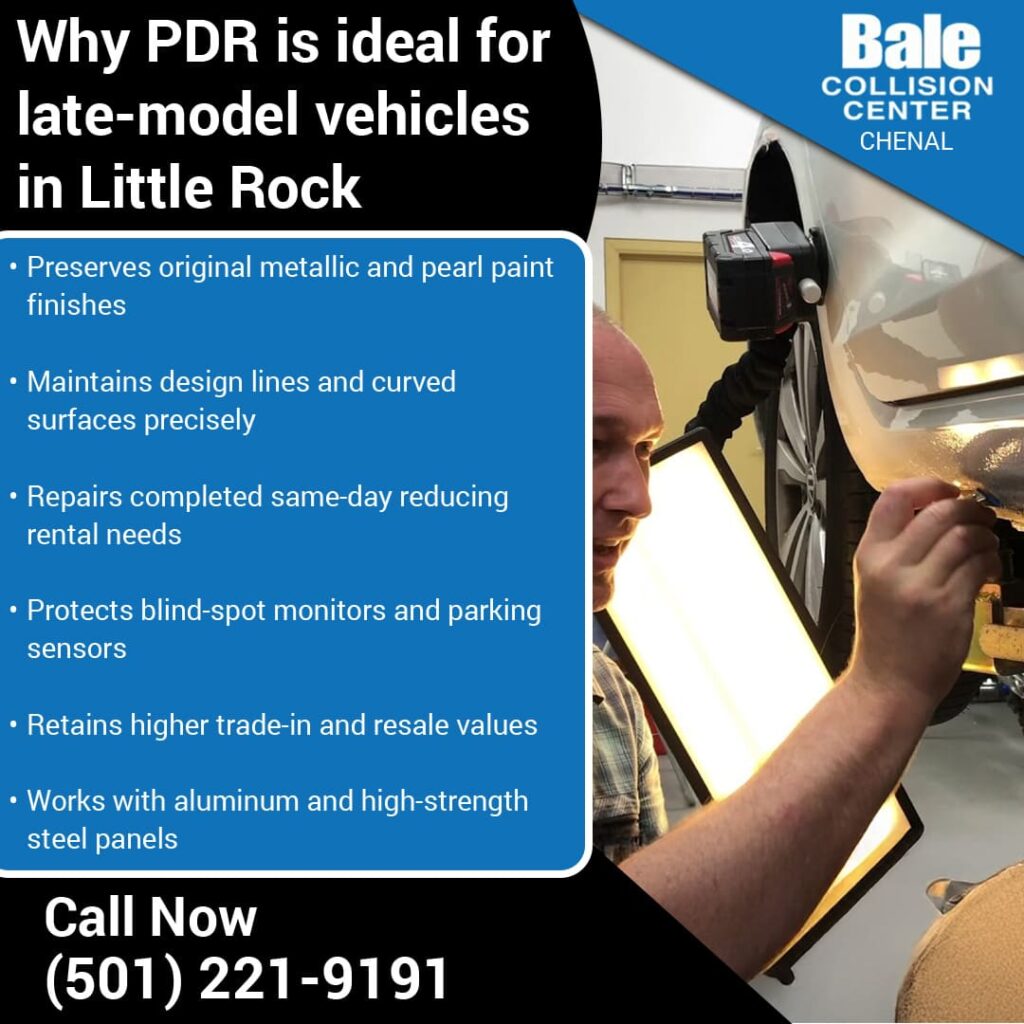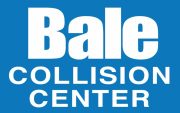Late-model vehicles come with advanced finishes, lightweight materials, and intricate body lines that make traditional dent repair more complicated and expensive than many drivers expect. A vehicle owner wants their vehicle’s factory paint protected, its resale value preserved, and its safety features left undisturbed. Traditional methods involving sanding, fillers, or repainting can compromise these goals by lowering long-term value and creating noticeable differences in finish.
At Bale Collision Center (Chenal), we use paintless dent repair (PDR) to solve these concerns and restore dents without disturbing the original paintwork. For late-model vehicles, this is a smarter choice because it maintains manufacturer standards for appearance and performance while saving time and cost. Our certified technicians are trained to work with modern materials like aluminum and high-strength steel using tools and methods designed for precision. By choosing us for PDR in Chenal Parkway, Little Rock, AR, you can trust that your repair will protect both the look and value of your vehicle.

What Paintless Dent Repair Means for Car Owners
Paintless dent repair (PDR) fixes dents by reshaping panels without sanding, fillers, or repainting. Technicians use specialized tools to access the dent from behind the panel and apply controlled pressure to move the metal back into its original form.
This process avoids body filler or primer, which are common in conventional dent repairs. For example, a door ding on a late-model sedan can be restored in hours rather than days because there is no waiting for paint to cure. Hail damage on aluminum hoods is another case where PDR is effective, as the factory coating remains intact throughout the repair.
By working directly with the panel, PDR keeps original manufacturing tolerances and reduces the risk of paint mismatches. For car owners, this means a faster repair timeline and lower overall repair costs compared to traditional body shop methods.
Key Benefits of PDR for Late-Model Vehicles
Protects Original Paint and Appearance
PDR keeps the factory paint intact and preserves the manufacturer’s original design. Unlike sanding and repainting, this method restores the dent without altering the protective coating or color consistency of the vehicle.
For example, metallic or pearl finishes on late-model SUVs can be very costly to match if repainting is required. Even a small mismatch in shade lowers overall appearance. By using PDR, the original finish remains untouched, keeping the car’s design lines and paint quality as intended.
This also reduces the risk of long-term issues like peeling clear coat or uneven texture, which sometimes occur with traditional repair methods. For car owners in Little Rock, protecting the original paint finish means the vehicle not only looks better but also holds its factory integrity longer.
Saves Time and Reduces Costs
PDR offers faster turnaround and lower repair costs compared to traditional dent repair. Because no paint, fillers, or drying times are required, many dents can be repaired within hours instead of several days. PDR often is less expensive than conventional repairs. For example, repairing hail dents on a hood with PDR may take one day, while repainting could require up to three days and additional material costs.
This time efficiency benefits car owners who depend on their vehicles daily. It also reduces the need for rental cars or extended insurance claims, saving money on related expenses. At Bale Collision Center, our certified team on Chenal Parkway in Little Rock, AR, uses this process to deliver both speed and reliability.
Helps Maintain Resale and Trade-In Value
Vehicles repaired with PDR typically appraise higher than those with repainted panels. Dealers and private buyers often check paint thickness or look for signs of body filler. Repainting a panel, even with expert color matching, can lower resale or trade-in value. Vehicles with original paint may retain hundreds to thousands of dollars more in trade-in offers compared to those with repainted parts. For late-model cars less than five years old, this difference can be even greater.
By choosing PDR, car owners maintain the untouched factory finish that signals quality and care to potential buyers. This not only helps with private resale but also when trading in at dealerships that value originality in their appraisals.
How PDR Supports Modern Vehicle Design
Working with Lightweight Metals
PDR adapts to aluminum and high-strength steel panels by using specialized tools and controlled pressure. These metals are common in late-model vehicles because they reduce weight and improve fuel efficiency, but they also require careful handling.
Aluminum, for example, does not retain shape memory the way steel does. Technicians must apply slower, precise pushes and sometimes controlled heat to prevent cracking. High-strength steel resists reshaping and demands advanced leverage tools to restore dents without overstretching the panel.
At Bale Collision Center on Chenal Parkway in Little Rock, AR, our team is trained to work with these materials, protecting factory finishes while addressing dents caused by hail, parking lot impacts, or minor collisions.
Respecting Complex Body Lines and Shapes
Modern vehicles feature sharp body lines and curved surfaces that require precise dent repair. Any misalignment can distort the vehicle’s appearance and reduce its market value. For example, a dent along the contour of a late-model truck fender can be more noticeable than a flat-panel dent because it interrupts the design line. With PDR, technicians restore the metal gradually, following the original shape without sanding or filler.
This approach keeps the vehicle’s design intact and avoids the risk of uneven reflections, which can occur when panels are repainted. Maintaining these features is particularly important for brands that market their vehicles on aesthetics and aerodynamic performance.
Keeping Safety and Electronics Intact
PDR avoids interference with sensors, cameras, and driver-assist systems embedded in late-model vehicles. Unlike traditional body repair, which may require sanding or panel replacement, PDR restores the dent without disturbing the underlying technology.
Advanced driver-assist features, such as blind-spot monitoring, parking sensors, and lane-keeping cameras, are often located near bumpers, quarter panels, or side mirrors. Repainting or replacing these parts can sometimes require recalibration, adding time and cost to the repair.
By choosing PDR, car owners reduce the risk of disrupting these systems. The original panel remains in place, and electronic components stay untouched. This makes PDR both a cosmetic and functional solution for keeping vehicles safe and reliable after minor damage.
Why Choosing the Right Shop Matters
Skilled Technicians and Certification
The quality of PDR depends on the technician’s skill and certification. Late-model vehicles require advanced knowledge of materials like aluminum and high-strength steel, along with experience handling complex body lines.
At Bale Collision Center in Little Rock, our team holds I-CAR Platinum certification, which is the highest level of training in collision repair. Certified technicians understand how to read dent patterns using specialized lighting and reflection boards. This precision allows dents to be removed without leaving behind ripples or stress marks.
Experience also matters. Our team has repaired thousands of dents on vehicles ranging from family SUVs to luxury sedans. That level of practice helps us deliver consistent results that maintain the look and value of your car, making us one of the best PDR shops in the area.
Specialized Equipment for Modern Repairs
PDR for late-model vehicles requires tools designed for complex panels and sensitive finishes. Generic tools are not enough to repair aluminum or high-strength steel without risking further damage. For example, our shop uses specialized rods that prevent overstretching on aluminum hoods and doors. We also use advanced lighting systems that highlight every contour of the dent, ensuring complete restoration.
When repairing dents near design lines or curved surfaces, precision tools allow controlled reshaping that maintains the vehicle’s original appearance. By combining proper equipment with training, we provide safe and accurate dent repair that supports the needs of today’s vehicles.
Transparency in Service
Clear communication builds trust during the repair process. Car owners want to know the cost, timeline, and insurance coverage before committing to repairs. At Bale Collision Center, we provide detailed written estimates that outline the work needed. We also work directly with major insurance companies, including State Farm, Allstate, and USAA, to streamline claims and reduce delays. Customers receive updates during the repair process so they know when their vehicle will be ready.
This transparency means no hidden costs or surprises. Our goal is to make dent repair as straightforward as possible while delivering results that prove why we are regarded as one of the best PDR shops in Little Rock, AR.

Bale Collision Center: Trusted PDR in Chenal Parkway, Little Rock, AR
Expert Technicians with Advanced Training
Our team at Bale Collision Center combines formal training with extensive hands-on experience in paintless dent repair. Our I-CAR Platinum-certified technicians are proficient in working with aluminum, high-strength steel, and modern paint systems. This expertise allows us to provide precise PDR in Chenal Parkway, Little Rock, AR, restoring late-model vehicles while preserving factory finishes.
Precision Tools for Modern Vehicles
We use specialized PDR tools designed to handle the unique challenges of today’s cars and trucks. From nylon-tipped rods for aluminum panels to advanced reflection lighting for accurate dent assessment, our equipment allows precise repair on curved surfaces, doors, hoods, and fenders without sanding, fillers, or repainting.
Comprehensive Support for Vehicle Owners
At Bale Collision Center, we guide customers through every step of the repair process. We provide detailed estimates, coordinate directly with insurance providers, and offer regular progress updates. Our focus on clear communication ensures a smooth, transparent experience for drivers in Chenal Parkway, Little Rock, AR.
One satisfied customer (J. Caine) shared his experience: “I absolutely love Bale. Courteous and exact in their work. Betty is absolutely wonderful. Not only is she wonderful to interact with, but she is spot on with her estimates. I have now come to them 4 times. They even have a new system that texts you information on the status of your repair with a link that gives more information. Definitely a strong suggestion to me. If you’re in a collision, it is difficult to find better.” This feedback highlights our commitment to precision, customer care, and keeping clients informed throughout the repair process.
Quality Results You Can Trust
With over 70 years of collision repair experience, we have successfully repaired thousands of vehicles, ranging from compact cars to full-size trucks. Our dedication to accuracy, speed, and care has earned us a reputation as one of the best PDR shops in Chenal Parkway, Little Rock, AR, for maintaining vehicle appearance and value.
Schedule Your Professional Dent Repair Now
Paintless dent repair is ideal for late-model vehicles because it preserves factory finishes, maintains vehicle value, and provides cost- and time-efficient repairs. By avoiding sanding, fillers, or repainting, PDR keeps both appearance and functionality intact.
Contact Bale Collision Center today at (501) 221-9191 or email bccwlr@baleautomotive.com for professional PDR in Chenal Parkway, Little Rock, AR. Our certified technicians provide precise, efficient repairs while preserving your vehicle’s appearance and value.
